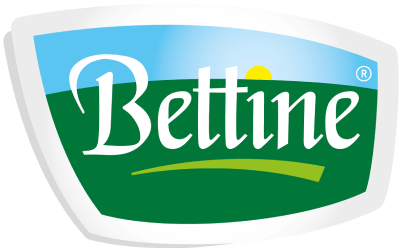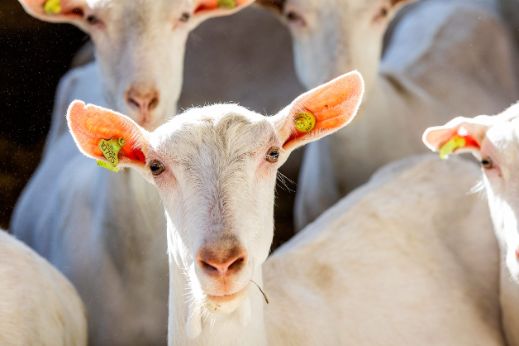Frequently asked questions
Are you curious about Bettine or goat cheese?
Take a look at our frequently asked questions to see if your question is already answered. If your question is not listed, feel free to contact us. We will be happy to help you further.
General questions
Bettine products can be bought at your nearest supermarket, cheese shop or wholesaler. Wondering where to buy a specific product? Then look up your product under 'Goat's cheese'.
No, Bettine makes all its products from pasteurised goat's milk. As a result, there is NO risk of getting Q fever if you eat these products. This has been scientifically proven.
Cheese is allowed during pregnancy. Pregnant women are advised against eating foreign soft, raw-milk cheeses. Bettine's cheeses are made from pasteurised milk and are therefore safe for you and your baby.
Bettine makes all its fresh goat cheese products at two production sites in Etten-Leur. Production is not outsourced to other companies.
Yes indeed, goat milk is very healthy for puppies! Many dog breeders feed their puppies with goat's milk to get beautiful and healthy offspring. The dogs suffer less diarrhoea when drinking goat's milk.
According to the Health Council's new guidelines on healthy eating, one should get 2 to 3 servings of dairy per day. This can be milk, yoghurt, quark and (goat) cheese.
Yes, you can, because goat cheese does not contain gluten.
Goat milk is not a drug, but a healthy natural dairy milk with the added advantage of being easier to digest. This is due to its protein structure, softer curd and because the fat globules (fatty acid molecules) in goat dairy are much smaller than those in cow dairy. It can therefore be soothing for problems with sensitive digestion.
We do not sell raw goat milk. Since 2022, Bettinehoeve has stopped selling UHT goat milk. The reason is that we are a cheese factory and we want to further focus on producing goat cheeses. The goat milk was packaged by an external company, however, we now want to use this milk stream to make other products from it.
An indication on the packaging is mandatory when the cheese is made from raw milk.
Most cheese produced in the Netherlands is made from pasteurised milk (including Bettine cheese). Pasteurised milk is heated briefly to render bacteria harmless. Some foreign cheeses are made from raw, unpasteurised milk. These cheeses can therefore contain bacteria such as listeria bacteria.
You can recognise raw milk cheese by the indication 'au lait cru' on the label. If you buy cheese that is not pre-packaged, for instance at the market, ask the seller whether the cheese has been pasteurised.
Every year we receive many requests for sponsorship, from which we are forced to make a considered choice. Our sponsorship budget is limited and no matter how good the organisers' objectives are, we cannot respond to all requests. Sponsorship is about making choices, conscious choices.
We really appreciate you looking into whether we can support your charity too. If you would like to be considered for sponsorship, we kindly ask you to submit your application and we can consider it.
Bettinehoeve takes its name from the seventeenth-century word 'Bettina', meaning goat.
Johan, the founder of Bettine geitenkaas chose this name in 1982, as goat cheese was not popular in the Netherlands at the time. Unknown makes unloved.
So Johan decided to brand his goat's cheese. He checked the dictionary and came across 'Bettinna', the old Dutch word for 'goat'. Johan turns it into 'Bettinne' and it works: people taste it and take a piece of cheese home.
Goat cheese
Pasteurised milk has been heated to 72ºC for at least 15 seconds to kill germs. The cheeses made by Bettinehoeve are made exclusively from pasteurised milk.
It has to do with the stomach of the goat and the stomach of the cow. Goats and cows both eat food that contains the substance carotene. Goats convert carotene into vitamin A. The yellow dye from carotene can no longer get into the cheese. Cows do not convert carotene and that dye gets into the cheese. That is why cheese from cow's milk is yellow and goat's cheese is white.
Hard cheeses keep well at a temperature of around 15 degrees. If you do keep this cheese in the fridge, do so in the vegetable drawer. Fresh goat's cheese should always be kept in the fridge at a temperature of 7 degrees Celsius.
Yes, goat cheese is easier to digest. Due to the smaller milk fat globules in the milk, goat milk, and therefore goat cheese, is easier to digest and better tolerated than cow's milk products.
Yes, goat cheese is easier to digest. Due to the smaller milk fat globules in the milk, goat milk, and therefore goat cheese, is easier to digest and better tolerated than cow's milk products.
Yes, you can eat goat cheese as part of a ketogenic diet. Healthy fats are a central part of a keto diet. Our goat cheese is low in lactose, making it a good fit for people following a keto diet. Goat cheese can be a great way to add healthy fats to a keto salad, or you can add one of our fresh goat cheeses to a keto omelette, for example.
Bettine also makes organic goat's cheese. See our product overview.
Yes, this white mould rind is edible and gives the cheese its slightly tangy flavour.
Goat milk contains less lactose than cow's milk and is therefore better tolerated than cow's milk. Of course, it depends on the degree of intolerance and we therefore recommend that you consult your doctor or dietician about this first.
Preparation
To make solid cheese from milk, the milk must be curdled. To curdle our cheese, we use microbial rennet, which is a vegetarian rennet. We use this for all our fresh goat's cheese products.
We therefore do not use animal rennet.

